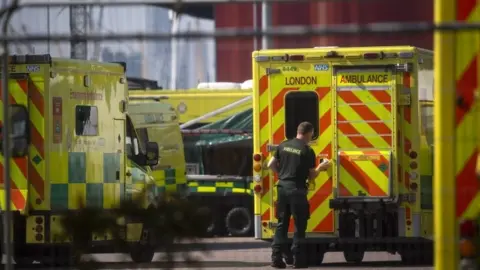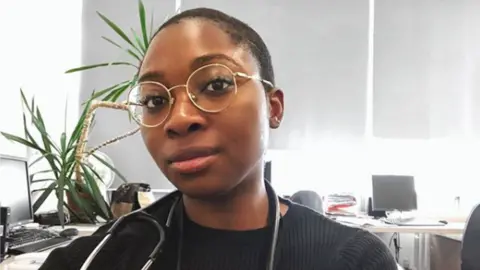Coronavirus: Ethnic minorities 'are a third' of patients
 PA Media
PA MediaThere is "emerging evidence" to suggest coronavirus is having a disproportionate impact on people who are black, Asian and minority ethnic.
Research suggests that more than a third of patients who are critically ill in hospital with the virus are from these backgrounds.
It comes after Labour called for an urgent investigation into why these communities are more vulnerable.
The government said it was committed to reducing health inequalities.
Only 14% of people in England and Wales are from ethnic minority backgrounds, according to the 2011 census.
However, the Intensive Care National Audit and Research Centre found that 34% of more than 3,000 critically ill coronavirus patients identified as black, Asian or minority ethnic.
"My father died on my ward"
Dr John Chinegwundoh, 50, works as a consultant respiratory physician at Kingston Hospital in south-west London and has recently lost colleagues, and his 93-year-old father, to coronavirus.
His older brother has also recently tested positive for the disease.
 Chinegwundoh family
Chinegwundoh family"My dad was being looked after in my hospital, on my ward," he said. "It was good that I could be there and hold his hand, explain things to him.
"But bad that I have to go back and carry on caring for people going through the same things."

- A SIMPLE GUIDE: How do I protect myself?
- HOPE AND LOSS: Your coronavirus stories
- LOOK-UP TOOL: Check cases in your area
- VIDEO: The 20-second hand wash
- STRESS: How to look after your mental health

He described his father Lawrence as a "special, loving and gentle man who will be deeply missed by the Nigerian community", and had been looking forward to his 60th wedding anniversary this year.
Dr Chinegwundoh said it was important the government tracked data about coronavirus cases by ethnicity so that "lessons could be learnt for the future to support communities".
Labour said the disproportionate number of doctors from ethnic minority backgrounds who had died from coronavirus was "deeply disturbing".
'Please stay home'
 Awan family
Awan familyAmer Awan, 44, from Birmingham, recently lost his father Nazir to the virus after days in intensive care.
The grandfather-of-six, who was a leading businessman and philanthropist, was described by his family as a "legend, the backbone of his community, a man who loved his city and gave so much back to it".
He has implored the public to stay home and said his father had strictly followed social distancing advice.
"When you can't even hug your mother two hours after your father passes away, that pain really does affect you," he said. "It hurts you so much.
"If you love your parents, your families, your friends, then please stay home.
"Appreciate the time you have with them because you never know when it'll be gone," he said.
'You're worried about masks running out'

Dr Chidera Ota, 25, is a junior doctor working in intensive care at Ealing Hospital in London - the capital is one of the worst affected and most diverse areas in England.
As a whole, 40% of people living in London are from ethnic minority backgrounds.
Dr Ota said some of her colleagues had bought their own goggles and visors because of a lack of personal protective equipment (PPE) and that most of her patients were from ethnic minority backgrounds.
"Working on the front line is a worry, you're exposed to a lot of risk and you're concerned about masks running out," she said.
Cultural factors such as multi-generational households and reliance on places of worship and community centres could be contributing to the data, she suggested.
"Language barriers for people who can't speak English, especially when you can't say if you're in pain or short of breath, can have a huge impact," she said.
"Particularly when you can't bring a family member with you to hospital now to help translate because of the virus."
She added that underlying health conditions liked diabetes and high-blood pressure could also be a factor.
Dr Zubaida Haque, deputy director of the race equality think tank Runnymede Trust, said ethnic minority communities were over-represented among families living in poverty and over-crowded housing.
"They're also more likely to be in low-paid jobs or key workers - crucial transport and delivery staff, health care assistants, hospital cleaners, adult social care workers as well as in the NHS," she said.
"All of which bring them into more contact with coronavirus and so increase their risk to serious-illness and death."
The Department of Health and Social Care said: "Any death from this disease is a tragedy and there is emerging evidence to suggest that Covid-19 may be having a disproportionate impact on ethnic minority groups.
"As part of a continuous effort to reduce health inequalities, the government will be working with Public Health England to look further into this and we will be releasing further details shortly."
